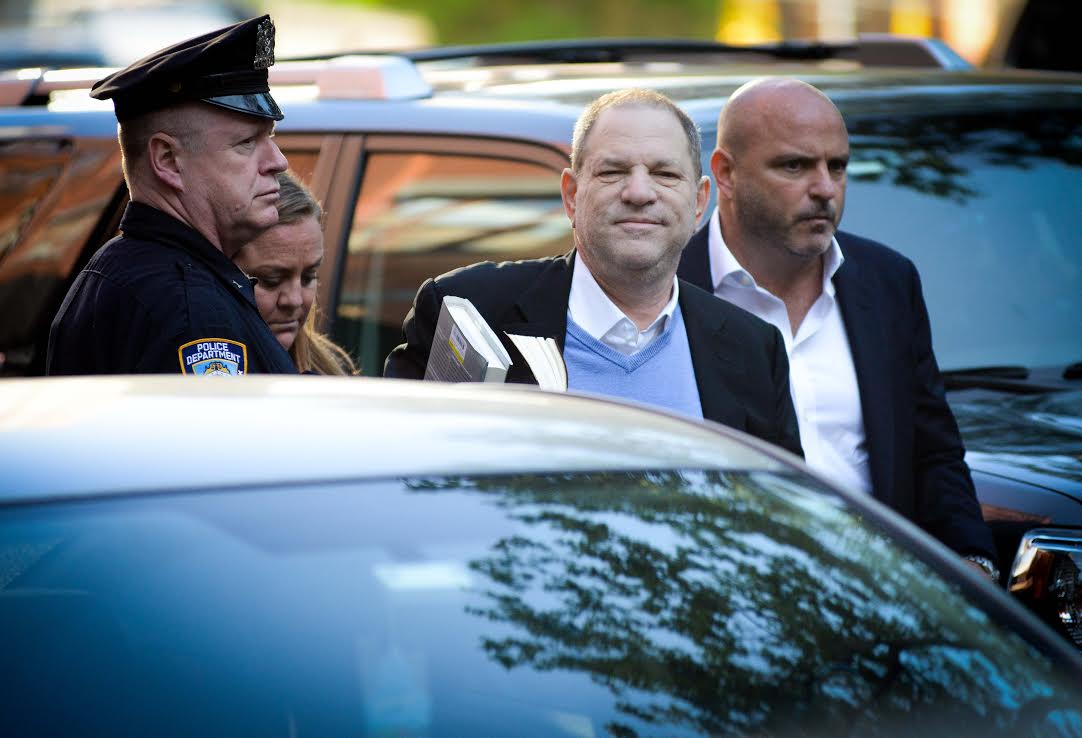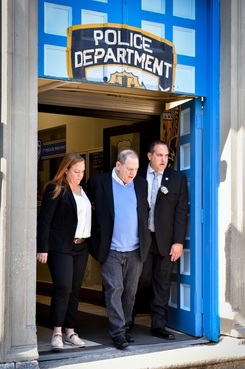Harvey Weinstein Arraigned on Rape Charges
The former Hollywood producer is facing multiple sexual assault charges connected to two separate incidents.
May 25, 2018 at 07:48 AM
4 minute read
 Movie mogul Harvey Weinstein arrives at the 1st Precinct in Lower Manhattan on Friday. Photo: David Handschuh/NYLJ.
Movie mogul Harvey Weinstein arrives at the 1st Precinct in Lower Manhattan on Friday. Photo: David Handschuh/NYLJ.
Former Hollywood producer Harvey Weinstein was arraigned in Manhattan criminal court Friday morning on charges of rape in the first and third degrees, as well as criminal sexual act in the first degree, the New York City Police Department and Manhattan District Attorney's Office said.
The charges stemmed from alleged sexual assaults against two women in separate incidents in 2013 and 2004, the DA's Office said.
In a statement from a police spokesman, the department thanked the “brave survivors” in the case “for their courage to come forward and seek justice.”
In a separate statement, District Attorney Cyrus Vance Jr. called the charges against Weinstein “significant progress in this active, ongoing investigation.”
Benjamin Brafman of Brafman & Associates, who represents Weinstein, said immediately after the arraignment his client intends to plead not guilty to the charges, calling them “constitutionally flawed.”
He added later in an email he intends to file a motion to dismiss the charges “as being legally flawed and not supported by credible evidence.”
 Weinstein is taken from
Weinstein is taken fromthe 1st Precinct in
lower Manhattan on Friday.
Photo: David Handschuh/NYLJ
Bail for Weinstein was set at $1 million cash with a $10 million bond alternative, according to the DA's Office. Weinstein will wear a monitoring device as well, and has surrendered his passport. He is restricted to travel within New York and Connecticut, absent approval from prosecutors and the court.
Weinstein's appearance in court followed his voluntary surrender at the 1st Precinct in Lower Manhattan this morning. He arrived at the 1st Precinct shortly before 7:30 a.m., wearing a dark blue sports jacket and a button-down shirt, flanked by two detectives.
Following Weinstein's arraignment, Brafman told reporters that Weinstein has been under investigation for the past seven months, and that the U.S. Attorney's Office for the Southern District of New York has its own investigation underway.
“Mr. Weinstein has always maintained that any sexual activity he engaged in was consensual,” Brafman said, according to a transcript of his remarks after the arraignment. “He has vehemently denied any of the allegations which suggest that he engaged in non-consensual sexual activity. Many of these allegations are long overdue, quite frankly, having been made about events that are alleged to have occurred many years ago.”
Also on Weinstein's defense team is Blair Berk of Tarlow & Berk in West Hollywood, California.
He said that a jury won't be convinced of Weinstein's guilt, “assuming we get 12 fair people who are not consumed by the movement that seems to have overtaken this case.”
Dozens of women have come forward to accuse Weinstein of sexually harassing and assaulting them since The New Yorker published a story detailing allegations against the former movie producer. The publication of the article last year created a cultural upheaval, launching the #MeToo movement, a broader societal and cultural reckoning with the treatment of women by men in positions of power in the workplace and beyond.
The allegations against Weinstein ultimately toppled him from his namesake media production company, but the allegations have had a ripple effect. A 2015 incident involving an Italian model, Ambra Battilana Gutierrez, was believed by some law enforcement officials in New York to justify misdemeanor charges. However, Vance's office declined to prosecute at the time.
The Manhattan DA's Office argued that the evidence was insufficient to prove the crime. However, the decision, which fully came to light in the New Yorker article, resulted in a backlash against Vance, who was accused by some of being too soft on a powerful individual, in an office that routinely prosecutes misdemeanor sex crimes with less evidence.
In the wake of that article, the Manhattan DA's Office ultimately launched an investigation into Weinstein based on separate incidents, which led to the calling of a grand jury.
News of Weinstein's impending arrest first emerged on Thursday.
Andrew Denney and Christine Simmons of the New York Law Journal each contributed reporting to this article.
This content has been archived. It is available through our partners, LexisNexis® and Bloomberg Law.
To view this content, please continue to their sites.
Not a Lexis Subscriber?
Subscribe Now
Not a Bloomberg Law Subscriber?
Subscribe Now
NOT FOR REPRINT
© 2025 ALM Global, LLC, All Rights Reserved. Request academic re-use from www.copyright.com. All other uses, submit a request to [email protected]. For more information visit Asset & Logo Licensing.
You Might Like
View All


Prosecutors Ask Judge to Question Charlie Javice Lawyer Over Alleged Conflict
Trending Stories
- 1Silk Road Founder Ross Ulbricht Has New York Sentence Pardoned by Trump
- 2Settlement Allows Spouses of U.S. Citizens to Reopen Removal Proceedings
- 3CFPB Resolves Flurry of Enforcement Actions in Biden's Final Week
- 4Judge Orders SoCal Edison to Preserve Evidence Relating to Los Angeles Wildfires
- 5Legal Community Luminaries Honored at New York State Bar Association’s Annual Meeting
Who Got The Work
J. Brugh Lower of Gibbons has entered an appearance for industrial equipment supplier Devco Corporation in a pending trademark infringement lawsuit. The suit, accusing the defendant of selling knock-off Graco products, was filed Dec. 18 in New Jersey District Court by Rivkin Radler on behalf of Graco Inc. and Graco Minnesota. The case, assigned to U.S. District Judge Zahid N. Quraishi, is 3:24-cv-11294, Graco Inc. et al v. Devco Corporation.
Who Got The Work
Rebecca Maller-Stein and Kent A. Yalowitz of Arnold & Porter Kaye Scholer have entered their appearances for Hanaco Venture Capital and its executives, Lior Prosor and David Frankel, in a pending securities lawsuit. The action, filed on Dec. 24 in New York Southern District Court by Zell, Aron & Co. on behalf of Goldeneye Advisors, accuses the defendants of negligently and fraudulently managing the plaintiff's $1 million investment. The case, assigned to U.S. District Judge Vernon S. Broderick, is 1:24-cv-09918, Goldeneye Advisors, LLC v. Hanaco Venture Capital, Ltd. et al.
Who Got The Work
Attorneys from A&O Shearman has stepped in as defense counsel for Toronto-Dominion Bank and other defendants in a pending securities class action. The suit, filed Dec. 11 in New York Southern District Court by Bleichmar Fonti & Auld, accuses the defendants of concealing the bank's 'pervasive' deficiencies in regards to its compliance with the Bank Secrecy Act and the quality of its anti-money laundering controls. The case, assigned to U.S. District Judge Arun Subramanian, is 1:24-cv-09445, Gonzalez v. The Toronto-Dominion Bank et al.
Who Got The Work
Crown Castle International, a Pennsylvania company providing shared communications infrastructure, has turned to Luke D. Wolf of Gordon Rees Scully Mansukhani to fend off a pending breach-of-contract lawsuit. The court action, filed Nov. 25 in Michigan Eastern District Court by Hooper Hathaway PC on behalf of The Town Residences LLC, accuses Crown Castle of failing to transfer approximately $30,000 in utility payments from T-Mobile in breach of a roof-top lease and assignment agreement. The case, assigned to U.S. District Judge Susan K. Declercq, is 2:24-cv-13131, The Town Residences LLC v. T-Mobile US, Inc. et al.
Who Got The Work
Wilfred P. Coronato and Daniel M. Schwartz of McCarter & English have stepped in as defense counsel to Electrolux Home Products Inc. in a pending product liability lawsuit. The court action, filed Nov. 26 in New York Eastern District Court by Poulos Lopiccolo PC and Nagel Rice LLP on behalf of David Stern, alleges that the defendant's refrigerators’ drawers and shelving repeatedly break and fall apart within months after purchase. The case, assigned to U.S. District Judge Joan M. Azrack, is 2:24-cv-08204, Stern v. Electrolux Home Products, Inc.
Featured Firms
Law Offices of Gary Martin Hays & Associates, P.C.
(470) 294-1674
Law Offices of Mark E. Salomone
(857) 444-6468
Smith & Hassler
(713) 739-1250







